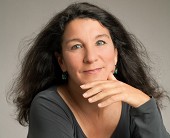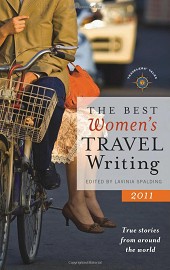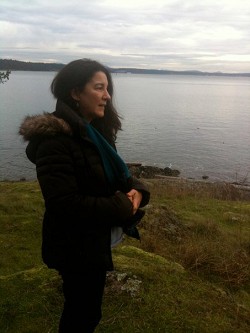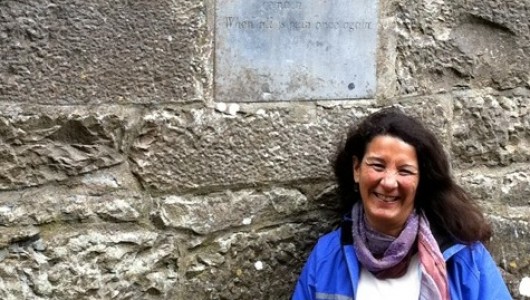Susan Rich is the author of three collections of poetry, The Cartographer’s Tongue/Poems of the World, Cures Include Travel, and The Alchemist’s Kitchen. She has received awards from PEN USA, The Times Literary Supplement (London), and Peace Corps Writers. Her fellowships include an Artists Trust Fellowship from Washington State and a Fulbright Fellowship to South Africa. She serves on the boards of Crab Creek Review, Floating Bridge Press and Whit Press. Rich has received residencies from Hedgebrook, Tyrone Guthrie Center (Ireland), Ucross Foundation, and Fundacion Valparaiso (Spain). Recent poems have appeared in the Antioch Review, Harvard Review, Poetry International and TriQuarterly. Born in Brookline, Massachusetts, she now makes her home in Seattle, WA where she teaches English and Film Studies at Highline Community College. Visit her at www.susanrich.net
When did you first know you were a traveler?
I think it was the postage stamps. The bright colors of the women on the stamps from Fiji mesmerized me. The stamps from countries such as the Cook Islands or Mauritania—beautiful words that conjured up worlds I could barely imagine. I loved the smell of those stamps and the postcards and envelopes they so often arrived on. I loved the stores (do these stores still exist?) that sold nothing but cellophane packages with stamps from every corner of the globe. I sought to enter that stamp and mail myself clear across continents. on my first trip to Africa, it felt as if I were doing exactly that: traveling by virtue of imagination to a newfound place - one that had previously existed only in my stamp album.
What’s one memorable travel experience you’ve had?
I was invited to Palestine to teach human rights education to teachers and lawyers in 1995, it was after the oslo Accords and things were hopeful in that moment. During my ten-day stay I not only taught human rights but was invited to a wedding, received a marriage proposal, and learned firsthand that there are very few differences between Arabs and Jews. It was a short trip, but one that changed my life. As a Jewish American, I had been taught to fear Arabs in subtle and not-so-subtle ways. Yet on this trip I was treated with more respect and honored in a way that has never happened before or since. I also had a great deal of fun.
Is there something you always do (or search out, buy, learn, pack, drink), whenever you’re on a trip?
The botanical gardens is my touchstone for every place I visit. I also believe (when possible) in packing a favorite coffee cup.Through travel, have you overcome any fears or obstacles?
At heart, I think of myself as a shy worrier. However, when I mention this description to friends, they laugh at me. I’ve conducted human rights work in the West Bank and been an electoral supervisor in Bosnia. I’ve heard bullets whiz past my ears and spent an evening drinking tea with nomadic men on the edge of the Sahara. In South Africa, I lived alone in the country that statistically is known as the murder and rape capital of the world. It’s a mystery to me how these experiences started to accrue. And yet, they have and I’ve become braver for them.
As travelers, we spin ourselves around the globe with only a credit card and a passport for protection. And more often than not, the experiences that come to us are positive ones. In all of my decades of travel, I can think of only one time when things were actually dangerous (and it wasn’t in a war zone). So yes, travel has allowed me to privilege curiosity over fear, adventure over worry. I can’t imagine who I would be without my years of traveling to and living in different countries. So although I still worry about having to ask a stranger for directions and I still obsess about keeping my travel documents safe; I now know the joy of travel so far outweighs the problems.
What advice can you give to women who want to start traveling?
Do it. Don’t let the voice inside your head dictate or limit your life experiences. Whenever I go somewhere I make sure that there are places or people where I can land. Plan to do more than sightsee. As a writer, these places are often writing retreats or visiting writer friends, but that’s only one way to go. If there is a painting you’ve always wanted to see, you could create a trip around visiting that painting—or perhaps there is a famous restaurant in Spain you’ve always wanted to try. We live our lives only once. one. That’s not a very big number. I’d hate to miss anything because of my own self-imposed fears.
I am not a brave woman, but I have had travel experiences that have taught me to be braver. The challenges I’ve overcome as a traveler have translated into the skills I need to live my everyday life.
What’s on your list of future destinations?
I’ve always wanted to travel to India, but this isn’t a trip I can do without a lot of time and planning. There is a hotel in Karola, in the South of India. that transforms into a writing residency during the monsoon season; spending time there is high on my list. I’m fond of the word fjords, so I’d love to visit any of the Scandinavian countries. I also am very fond of returning to countries where I’ve been before. I was in Ireland this summer for my third time, but I’m already working on going again. Travel and return; that might be my motto.












